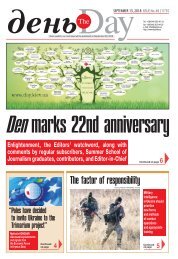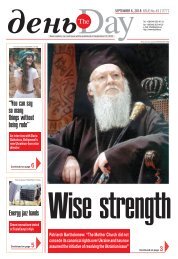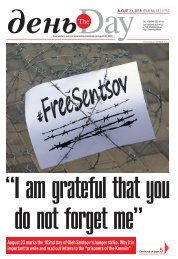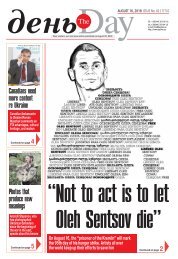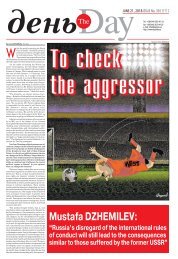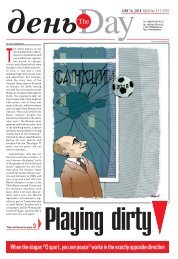36_ENG
Create successful ePaper yourself
Turn your PDF publications into a flip-book with our unique Google optimized e-Paper software.
WWW.DAY.KIEV.UA<br />
CULT URE No.<strong>36</strong> JUNE 12, 2018 7<br />
By Dmytro DESIATERYK, The Day<br />
The drama Touch Me Not (Nu Ma Atinge-<br />
Ma, Romania – Germany – Czech Republic<br />
– Bulgaria – France, 2018) became a<br />
real sensation of the last Berlinale,<br />
winning there both the Golden Bear<br />
for the best feature film and the award for the<br />
best debut.<br />
This work, done as a peculiar combination of<br />
live-action and documentary cinema, tells the<br />
story of three heroes – Laura, Tudor, and Christian.<br />
The first two are played by well-known actors<br />
Laura Benson (Dangerous Liaisons (1988),<br />
Ready to Wear (1994)) and Tomas Lemarquis<br />
(3 Days to Kill (2014), X Men: Apocalypse<br />
(2016), Blade Runner 2049 (2017)). Like many<br />
supporting characters, they share the same problem<br />
as they strive and at the same time acutely<br />
fear intimacy, corporeal and emotional alike.<br />
Christian practically plays himself: crippled by<br />
spinal muscular atrophy, he is completely free<br />
from prejudice and lives with the girl he loves.<br />
The film itself is a kind of story about liberation,<br />
about overcoming of protective mechanisms and<br />
taboos, sometimes in quite unusual ways.<br />
In the non-competitive program of the<br />
Molodist Festival, which ended in Kyiv on<br />
June 3, Touch Me Not was personally presented<br />
by the film’s director Adina Pintilie and the<br />
leading actress Laura Benson.<br />
Adina-Elena Pintilie was born in Bucharest<br />
on January 12, 1980. She debuted in 2003 as a<br />
documentary filmmaker. Her non-live-action<br />
works participated in the competition programs<br />
of the festivals in Locarno, Rotterdam, Leipzig,<br />
and Warsaw. Pintilie serves as artistic director<br />
and curator of the International Experimental<br />
Film Festival in Bucharest. Touch Me Not is her<br />
first live-action film.<br />
After the Kyiv premiere, Pintilie answered<br />
questions of The Day’s correspondent.<br />
How did it occur to you to make Touch Me<br />
Not?<br />
“When I was twenty, I thought I knew everything<br />
about how relationship should function,<br />
intimacy, our desire mechanism, and also what<br />
means beauty. But in the past years of life, I realized<br />
that actually I don’t know anything. Once<br />
clear ideas get destabilized when I enter in contact<br />
with real people and with real life. So, we set<br />
out on this journey to just question our own preconceived<br />
ideas about how intimacy functions,<br />
and to discover how people actually can access<br />
intimacy in the most unexpected ways. And back<br />
in 2013, we started an extensive casting process,<br />
which was more like in documentaries, but this<br />
film is not a documentary. We try to avoid all<br />
these labels, because the film is mainly a research<br />
one, it is a process film, a research film.<br />
“So, in 2013 we started this extending casting<br />
period. It was not like looking for actors, it<br />
was more like looking for like-minded people.<br />
And after finding them, we worked with video<br />
diaries, with a lot of filmed exercises – it was before<br />
the official shooting, where we could get accustomed<br />
with the camera being, like, a witness<br />
of some of our very personal, intimate stories.<br />
So, this kind of a long process helped to grow the<br />
trust between the participants in the project.”<br />
It looks like creating a commune of sorts.<br />
“It was like fiction functioning like more a<br />
sort of laboratory, like a safe place which allowed<br />
us to explore really sensitive areas. Because<br />
when you are protecting yourself under, let’s<br />
say, fictional character, in that convention you<br />
can go everywhere, because you don’t need to<br />
know what is real, what is invented, what is<br />
imagined, what is memory. Many of them came<br />
as themselves in the film. So, they were not playing<br />
with this mixture of fictional and real elements,<br />
they brought their own.”<br />
Did you have the help of professional psychologists?<br />
“Yes. For example, the emotional anatomy<br />
workshop: it’s designed by this very distinguished<br />
German performance artist and therapist<br />
Julia Sparmann. I found this very inspiring.<br />
So I proposed to collaborate and to create a workshop<br />
for the film, and within this structure,<br />
reenactment of the real workshop, we cast real<br />
people that wanted to work with this intimacy<br />
area in front of the camera, to share their experiences.<br />
And they were already entering this, I<br />
would call it, conventional laboratory. And<br />
everything that happens in this created structure,<br />
or a lot of what is happening there, it’s really<br />
authentic encounters between people. So,<br />
this is a very good example of how the mixture<br />
between staging and reality functions.”<br />
THE DRAMA TOUCH ME NOT BECAME A REAL SENSATION OF THE LAST BERLINALE<br />
REUTERS photo<br />
“We set out on this journey to just<br />
questionourownpreconceivedideas”<br />
Can your directorial approach be called anthropological?<br />
“I would not call it, because anthropologizing<br />
claims sort of objectivity. But this film is a very<br />
subjective emotional exploration that each of us<br />
went through. And by being highly subjective, I<br />
don’t think you can call it a scientific approach.<br />
I mean, in the end, if you look at psychotherapy,<br />
it is both sort of science, but it also involves high<br />
doses of subjectivity, intuition, and non-rational<br />
thinking, because they work a lot with the unconscious<br />
mind, with early memories, with a lot<br />
of emotions. So, that’s why I’m hesitating to put<br />
it in the area of science, but I would put it in the<br />
area of research. Research about human nature,<br />
in that sense it is connected to anthropology.”<br />
One of the protagonists is played by an actor<br />
with a disability. What was special about<br />
working with such an actor?<br />
The Golden Bear winner of the Berlin Film<br />
Festival Adina Pintilie discusses the intimacy<br />
and phenomenon of the Romanian cinema<br />
“For me it was very important in the casting<br />
process. And when trying to find these people,<br />
it was very important to feel that they have<br />
a strong motivation, emotional motivation to be<br />
part of the project. And Christian, it’s a very<br />
particular example of this, because he wanted<br />
to communicate with the audience. And actually,<br />
I think this film functioned like sort of a dialog,<br />
like many of the characters have their<br />
own, very specific views of the world, very progressive,<br />
and they would like to share it with<br />
the audience. And Christian said it from the beginning:<br />
‘I’m not afraid that this film is going<br />
to be attacked for me, for doing it. Because you<br />
know, the people who are going to attack the<br />
film are people who just actually have no idea<br />
about disability and about the relationship between<br />
disability and intimacy. They think that<br />
we, people who have different label on body, we<br />
just need to be taken care of, we are asexual, we<br />
don’t have any intimate life.’ And for him it<br />
was very important to enter into this communication<br />
with the audience and to share with them<br />
that people with the different label on bodies<br />
have the same desire, the same needs, and the<br />
same right to exist as sexual beings as any other<br />
person. He is also an activist for the rights of<br />
people with disabilities. And it was really an inspiring<br />
experience for all of us in the film to<br />
have Christian and Grit. They are a real couple,<br />
they are really passionate explorers of intimacy.<br />
Earlier only Christian was able to verbalize,<br />
to speak about this, but now Grit started to explain,<br />
and her voice is growing in this whole<br />
thing.”<br />
Do you see a difference between documentary<br />
and live-action cinema?<br />
“The border between the two is actually so<br />
fluid, because in the end, it’s about cinema,<br />
which is a very subjective experience of reality.<br />
It’s an illusion that you can capture the reality<br />
in a sort of an objective way. You cannot do<br />
something like that from the moment you choose<br />
to put the camera and to make a frame, and<br />
everything becomes a matter of subjective perception.<br />
I had the privilege to witness a master<br />
class that Werner Herzog [a German screenwriter,<br />
film director, author, actor, and opera<br />
director. – Author] gave some years ago in Salonica,<br />
and he was criticizing, debating with this<br />
view of documentary as being sort of fly-on-thewall<br />
approach, where you don’t interfere, you<br />
don’t alter reality. And he was saying, ‘I don’t<br />
want to be a fly on the wall, I want to be the bee<br />
that stings.’ Because you can’t have access to the<br />
truth of the human being by just putting the<br />
camera and watching that thing, that is happening<br />
in front of you. I have to be able to create situation,<br />
to provoke, to create the environment<br />
that can bring that truth to the surface. So, the<br />
reality is not what it is, it’s transformed by the<br />
subjective perception. And in that sense, I really<br />
don’t think there’s a distinction.”<br />
Now, when there are many different kinds<br />
of technologies that let one change one’s body,<br />
what do you think, how has the attitude to corporeality<br />
changed?<br />
“I basically can talk about my very subjective<br />
experience. I notice that in the past years<br />
at least, there is a strong interest for these selfexploration<br />
activities, like for workshops in<br />
different areas. And I think this happens everywhere<br />
in the world. Everywhere I traveled,<br />
there is growing interest in this process of getting<br />
to know your own body, and to be friends<br />
and accepting your body as it is. But luckily,<br />
more and more people start to look at that as<br />
something very normal, as something which is<br />
naturally part of your life and is worth exploring,<br />
because it helps you. If you know yourself<br />
better, you can solve also the other stuff. Actually,<br />
psychoanalysts have for a hundred years<br />
talked about how intimacy and sexuality are<br />
such natural parts of your life and your development.<br />
This all is so natural in psychotherapy,<br />
but for many other areas of discussion in our<br />
life, this is a difficult topic to approach. Psychoanalyst<br />
Michael Bader was explaining that<br />
your sexual behavior and your sexual fantasy<br />
can be key to read aspects of yourself also in<br />
other domains. So, you can judge yourself and<br />
say, ‘I’m wrong, I’m sick, I have to go to hospital<br />
to repair myself’ – or you can look with honesty<br />
at yourself and you say, ‘OK, I am like this,<br />
let’s try to understand what’s behind this behavior,<br />
why I am actually doing that.” There<br />
are ways of experiencing intimacy different<br />
from the norm, if you try to understand them<br />
and not put a label that they are wrong, first of<br />
all, you will have a better understanding of<br />
yourself, and then you will have a different relationship<br />
with the other person in front of you.<br />
So, you will not so easy become an extremist, or<br />
judgmental, or right-wing, the degree of aggressiveness<br />
has high chances to decrease.<br />
That’s why a film like this is important, because<br />
it’s offering a sort of mirror about how<br />
people can be different than what you think<br />
they are, how you think they should be.”<br />
In conclusion, a question asked from our<br />
Ukrainian perspective this time. It can be said<br />
that we here in Ukraine envy you, Romanian<br />
filmmakers, greatly, because you have just<br />
suddenly, after a prolonged period of communism<br />
and troubles, created an incredibly flourishing<br />
cinematic school. How have you managed<br />
to do it?<br />
“I don’t know. “I don’t know. I mean, the<br />
Romanian cinematic community was all the<br />
time clashing with political system, with the<br />
state system. So, you have this situation which<br />
is not so nice and cozy, it’s not so comfortable,<br />
so then you need to put extra energy to make<br />
things happen. Maybe this is energy which<br />
comes from having an enemy, having an antagonist.<br />
There are a lot of talented people, but not<br />
all of them functioning.”





